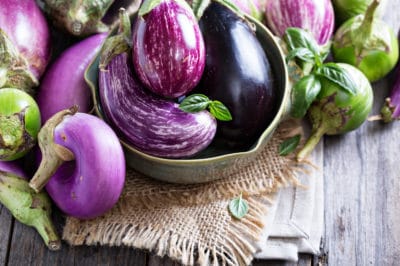What Is the Best Place for Growing Eggplant?
Eggplants (Solanum melongena) prefer at least six to eight hours of full sun and well-drained soil. Whether you’re planting in a vegetable garden, in containers or ornamental beds, choose an area that has good drainage and slightly acidic soil. For healthy foliage and colorful eggplant production, nighttime temperatures shouldn’t get below 70°F (21°C).
What Is the Best Way to Grow Eggplant Seeds?
Start your eggplant seeds indoors about six weeks before the last expected frost. Plant the seeds one-quarter-inch deep and locate the pots in a sunny location or under lights. The seeds need warm soil that’s 80°F (26°C) to 90°F (32°C) to germinate. You can also use heated mats under the pots to speed up germination, but remove the mats when your seedlings produce their first set of leaves.
How to Harden Off Seedlings before Planting
Whether you grow your plants from seed or buy them from a garden center,harden off before plantingthem in your garden. You do this by placing the plants outside during the day and bringing them back inside at night. Follow this routine for about three days and then leave the plants outside for 24 hours on the fourth day.
When Is the Best Time to Plant Eggplants?
Eggplants need warm soil to grow well, so when the weather in your region is consistently above 70°F (21°C), you can start planting your eggplants . This usually happens about 2 to 3 weeks after the final frost.
What Are the Best Soil Conditions for Eggplants?
The ideal soil conditions should have a PH between 6.0 and 7.0. You can do a home soil test to determine the PH or add an organic fertilizer, such as fish hydroslate, kelp emulsion or compost tea to your soil. You can also warm the soil by applying organic mulch to your garden.
How to Plant Eggplant Seedlings
Before planting, turn over the soil with a spade or tiller to a depth of 6 to 8 inches. As you till the soil, add organic matter such as, topsoil or compost to improve the soil fertility. Level the soil with a rake, removing stones, weeds and debris.
Plant your seedlings every 18 to 24 inches and keep rows about 30-inches apart.
How Often do Eggplants Need Water?
After planting, water the eggplantsat the rate of one inch every week. The best method is to water the plants thoroughly at one time, rather than applying several, short waterings. Watering too frequently causes the roots to remain shallow. Conserve water by applying organic mulch, such as grass clippings, wood chips and straw around the plants. This also helps prevent weed growth.
Do Eggplants Need Stakes for Support?
You can use tomato cages or stakes to support your eggplants as they mature, especially in windy areas. Staking helps prevent broken stems and diseased foliage that falls into the soil.
What Is the Most Common Eggplant Pest?
The most common pest to damage eggplants is the flea beetle. They are tiny, black beetles that eat holes in the eggplant leaves. Mature plants can survive flea beetle damage but not seedlings.
What is a natural method of controlling flea beetles?
One natural method of controlling flea beetles is to plant radishes among the eggplants. The radishes attract the beetles, keeping them off your eggplants. Another method is to cover the seedlings with garden fabric before the beetles appear on your crop.
What Is the Most Common Eggplant Disease?
The fungal disease, verticillium wilt is the most common disease that invades eggplants. It lives in the soil and travels through the plant’s roots into its vascular system. This disease causes the foliage to wilt, curl and turn yellow. Eventually, the leaves die and fall off.
What Method Stops Fungal Disease in Eggplants?
Unfortunately, once the verticillium wilt fungus infects the plant, it can’t be stopped. Remove the infected plants from the soil and don’t plant in the area in the future.
What Are Common Eggplant Varieties
Most eggplants require a growing season up to 75 days. If you’re region has a shorter season, choose the eggplant varieties that don’t take as long to mature. The following is a list of early and mid-season eggplant varieties:
Early Maturation:
- Black Beauty – 60 days
- Louisiana Long Green – 65 days
- Billionaire – 56 days
- Black Shine – 65 – 70 days
- Zebra 70 days
Mid-season Maturation:
- Casper – 70 – 75 days
- Classic- 76 days
- Italian Pink Bicolor – 75 days
- Santana – 80 days
- Diamond – 65 – 95 days
When Is the Best Time to Harvest Eggplants?
Since you can’t freeze or can eggplant, it’s a good idea to harvest the fruit when it reaches 3 to 5 inches long. The skin should be glossy for tender, high quality eggplants. If the skin appears dull, then the fruit is overripe. Eggplant stays fresh for about one week if stored at 50°F (10°C).
